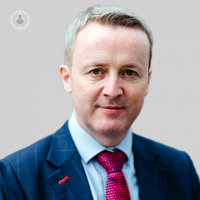Fatigue treatment and COVID-19
Written by:As described in his first article, consultant rheumatologist Dr Gerald Coakley describes how fatigue differs from being merely tired.
In this second article, Dr Coakley discusses how fatigue can be treated and how it related to the current situation with the COVID-19 pandemic.

What can people with fatigue do to alleviate their symptoms, both medically and through lifestyle changes?
If we are talking about normal, everyday fatigue, then healthy routines of exercise, sleep hygiene and a balance of work, rest, and relaxation can make a huge difference. Finding healthy ways like this of dealing with life’s unavoidable stressors is important.
Equally, it is just as important to avoid unhealthy ways of trying to relieve stress like smoking, drinking to excess, using other addictive substances, or even gambling and other risk-taking activities. These often feel relaxing or distracting from stress at the time, but they bring new problems and stresses of their own and ultimately, are counter-productive.
For people who think they may have myalgic encephalomyelitis (ME)/chronic fatigue syndrome (CFS), I think their first port of call should be their GP, who can exclude the main medical causes of fatigue which we have discussed. If their symptoms are intrusive and persistent, then I think a referral to a fatigue clinic in the NHS or in the private sector is a sensible next step.
As there is no single professional who can be realistically expected to deal with all aspects of ME/CFS and support people to recover, I would encourage anyone in this position to ensure that they are being referred to a multi-disciplinary team that has all the components required for diagnosis, rehabilitation, and where possible a return to study or employment and a normal or near-normal social and family life.
Is fatigue a commonly-occurring condition as a symptom of COVID at the moment?
Absolutely. Since May 2020, I have been seeing large numbers of people who caught COVID who have had persistent fatigue for months afterward. This is popularly known as long COVID, but in the UK, physicians usually refer to it as post-COVID-19 syndrome.
Some of these patients were hospitalised or ventilated on intensive care units, and there are complex reasons behind their persistent fatigue. Many have organ damage caused by the virus directly, or indirectly through provoking clotting problems. Others have had to deal with the psychological impact of having a serious, potentially fatal infection. Many experienced symptoms of post-traumatic stress disorder (PTSD), particularly those who were on ITU, and PTSD is an important cause of fatigue.
Preliminary data from the UK’s PHOSP COVID study which followed patients discharged from hospital with COVID show that only 25 per cent of patients felt fully recovered 12 months after discharge from hospital, which is a worryingly low figure.
The other big group with Long COVID is younger, reasonably fit people under the age of 50 who caught COVID that seemed fairly mild at the time and did not require hospitalisation, but has been complicated by a persistent fatigue problem.
We are still learning about this and it is too soon to draw firm conclusions about the mechanisms. However, from my perspective, long COVID in this group seems similar to the kind of post-viral fatigue syndrome I have been seeing for decades in a subset of people who catch glandular fever and a number of other viral or bacterial infections.
We still do not know what causes this, but we can usually give helpful advice and guidance that allows people to cope with their symptoms until, we hope, a natural recovery comes in its own time. I have seen many people who have made a steady recovery over a 12-month period, lots who have completely recovered, and unfortunately a proportion who seem to have got stuck.
If you feel that your life is being impacted by fatigue, don't hesitate to book an appointment with Dr Gerald Coakley via his Top Doctors profile today.


